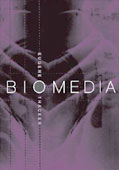


Italian version
 . book
. bookEugene Thacker
Biomedia
<book> University of Minnesota Press
ISBN 0816643539
Organic transformations hurt our sensitivity, since they represent the fear of the new body models, weak in their experimental constitution. This text collects a detailed and unique analysis of the relation between biotechnologies and media studies, which thoroughly examines their ethical, social and media aspects. Starting from the solid bases of contemporary practices, this text exudes awareness of the mechanisms of integration between advanced research technology and complexity of development. From the description of the uneasy marriage between industry and research to the many open source approaches developed spontaneously by experts in the field (such as the famous Bioperl, a version of the Perl language to manipulate DNA and proteins), the author tries to detach the medium from the process. The relations between the two different codes involved (of biotechnology and of computers) are highlighted, and both are used to describe entities and processes. This way, 'dry biology' (biology which doesn't use organic components) shows a new perspective of organic matter, where "data can't describe or replace the body, but can provide an index of its transformability". The media aspect of biotechnology is exploited by biotechnological art which, when it isn't made purely to shock, can dig deep holes in the propaganda spread by the industry and help redefine the concepts of ethics, which are often too firmly entrenched on naturist positions. The Critical Art Ensemble and the accusations against them by the american powers are one of the most manifest signals that innovative and non-aligned reflections are more necessary than ever to understand a biology which is exploding thanks to the endless possibilities of manipulation.